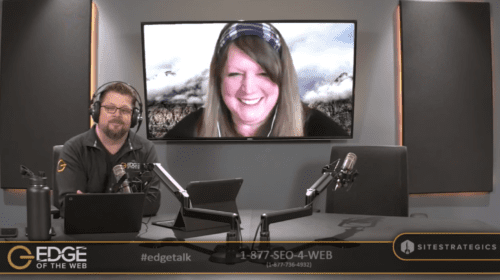Our special guest for episode 352 of the award-winning EDGE of the Web podcast was Kristine Schachinger of Sites Without Walls. Host Erin Sparks spoke with Kristine about how businesses can go about recovering from the negative impacts of a Google core update. Here’s what we learned:
Kristine Schachinger: Her Background and Experience

Kristine Schachinger has more than 22 years of experience in the digital marketing world, including website design and implementation, accessibility standards, and all aspects of website visibility, including SEO, social media, and strategic planning. She specializes in site health auditing and site forensics, technical SEO and site recovery planning, especially as it related to Google algorithm changes updates such as panda and penguin.
Kristine started her digital journey as a front-end developer and designer, then shifted over into SEO around 2005. The company she was working for at the time had a site that wasn’t ranking and her boss let her take a crack at it, and she never looked back. Right now a big priority in her work is doing site audits for clients who have been impacted by Google in the form of a manual action or the latest core update.
The Constant Stream of Google Updates
There have been a lot of big core updates in recent months, most of which we find out about a little after the fact, and lots of minor changes along the way we never really know about. A lot of people view these updates as some kind of penalty, but they really aren’t penalties. In Google-speak, “penalty” is reserved specifically for manual actions that show up in your webmaster tools. When an update occurs, some sites see a rise in rankings and visibility, while others go down. I like to refer to the latter as an “algorithmic devaluation.”
What to Do When You Get “Hit”
What do business owners need to know about Google updates and devaluations? If you see a minor devaluation, say 10-20%, that’s not such a big deal. There are going to be fluctuations for all sorts of reasons, some of which have nothing to do with Google and its changes. When you get into the 30-50% range there should be some concern, and if you get devalued more than 50% it can often be a sign that you were hit especially hard by an update, but not always. In some cases you devaluation might be the result of a technical error made by your own site developers.
What you want to do when you see a major hit is to work with a forensic auditor who can look at your site and find out what’s happening because they know what to look for and can compare that to the current known effects of any recent algorithm updates. Going through this process will not only help a site recover from an update, but also future-proof it to some extent as things continue to evolve. And Kristine only considers a site to be “recovered” if it has gained back at least 80-90% of the traffic it lost, and normally aims for 100% or more.
It’s Not About E-A-T Most of the Time
There’s always speculation about what’s causing devaluation to occur. Many want to say it must have to do with E-A-T (expertise, authoritativeness, trust), which seems logical in terms of how hard Google is always pushing the concept, but Kristine doesn’t really see it that way. Remember that E-A-T figures prominently in the Google Quality Rater Guidelines, meaning what humans should look for in terms of what makes for a quality site in Google’s eyes. It is not an SEO guide per se, although if you do a good job at meeting all those criteria for a quality site, you should basically be okay. But it’s not necessarily E-A-T that’s at play in an update.
You want to look at content query shifting because you’d be surprised how many cases where you can lose a lot of traffic just based on a few keywords. In some cases, fewer than 10 keywords can account for 60% of a site’s traffic fluctuation. But even more frequently, what Kristine finds is that critical technical errors are often the root cause. This is important because if Google can’t properly crawl your site, then it doesn’t even matter what content you have on there, good or bad. In other words, don’t automatically freak out about your content being wrong, but get someone to examine the technical side of your site to see what might be off.
It’s Usually About Severe Technical Errors
This is important because part of what’s constantly changing at Google is what technical site issues they decide to focus on. Take a site, for example, that had 800 different redirect loops on its site. They’ve been there for at least five years and the site has had amazing traffic. But if Google decides it is no going to no longer overlook all those redirect loops, that site’s traffic might fall off a cliff. But they don’t need to rewrite all their content based on the E-A-T myth, they just need to fix all those redirect loops and voila, problem solved. More often than not, there are serious technical issues that need to be resolved. Page load times could become an issue. Fix those issues and see how much traffic is recovered. You’ll be surprised and pleased.
So why is Google focusing on things like this? Kristine has a theory: She thinks Google is constantly looking for ways to reduce the resources needed to do its web crawling. For example, at one data center they built they had to also build a dam just provide power for the required level of cooling needed for the facility. So if Google can use its algorithms to force sites to fix all their technical issues, then Google will need fewer resources to do its crawling task. Google may be forcing you to fix the things on sites that are impeding its crawling task.
Think You Were Hit? Hire a Detective!
If you suspect you’ve been hit by an algorithm update but aren’t sure, you need to bring someone in from the outside. You shouldn’t do it yourself, and you shouldn’t have anyone do it who has been involved in recent work on your site. This is because you have to have someone who can come in and look at the site through an object, critical lens. And, of course, the pandemic has very much skewed things, especially in the medical field. Google has to push relevant, accurate COVID content so hard, and rightfully so, that other medical content is taking a hit, but they will recover naturally when the pandemic subsides.
You can also experience a decline that literally has nothing to with your site at all. One lawyer in Minnesota was seeing a significant decline in traffic and was freaking out thinking the SEO must be bad. But digging into the details, it became clear that his area was having a particularly harsh winter where it was -10 degrees for something like 60 days straight. Well, DUIs plummeted because no one was going out and that was why his traffic was down. This is why you need a forensic site auditor to tease out these kinds of contextual factors.
What a Business Should Look for in a Forensic Site Auditor?
There is no way to credential this piece of the industry. It’s all about experience and having a reputation for doing the work. Your average SEO simply isn’t up to this kind of task. After all, it’s probably inexperienced or substandard SEO work that created the problems over time to begin with. It’s not about just hiring yet another SEO consultant, it’s about hiring a good forensic auditor who specializes in this kind of detective work. Now, this can also be a pricey proposition for the ones who are the best at it, but if the price point is a problem, then you can get a referral for someone who they trust and know can do the work but at a more reasonable price. The cheapest option won’t be a real audit and won’t provide any solution at all.
Ask about the tools the auditor uses. Chief among them should be Screaming Frog. Anyone who says they can do an audit for you and doesn’t mention or know what Screaming Frog is should be avoided at all cost. Another excellent auditing tool is Sightbulb. And both those tools also have excellent technical support and service when you need things to be tweaked or slightly different from the norm. Those two are the best. There are other solid tools such as OnCrawl, DeepCrawl, and SEMrush.
How Long Does Recovery Take?
This is something a lot of business owners don’t understand. If you take a hit from an algorithm update, you won’t experience recovery until the next update happens. So you immediately do the work that needs to be done to find out the issues and resolve them, and then you wait for the next update to see the results. Updates are happening more frequently, like every 3-4 months, so you don’t have to wait too long to experience recovery. But it’s better to get on it right away and not suffer in silence with down traffic for a year or two before getting serious about fixing it.
And you should also set aside real money in a budget to do some kind of pretty serious site audit to proactively get things taken care of before they become a major headache. And not just a technical audit, which has its uses, but the technical auditor doesn’t understand what factors are important to Google from an SEO perspective. That’s why you need a forensic auditor. A good forensic auditor might uncover 100 different things that are wrong with a site, but not all of them are going to matter as much as others. You want to focus on the ones that are really going to move the needle in the right direction. That takes someone who knows what matters to Google.
Connect with Kristine Schachinger and Sites Without Walls
Twitter: @schachin (https://twitter.com/schachin)
LinkedIn: https://www.linkedin.com/in/kschachinger
Let Site Strategics Unpack Your Digital Marketing ROI
Stop wondering about your digital marketing ROI and find out what’s really happening with a Site Strategics report examining your SEO, content, social media, and PPC. Visit https://edgeofthewebradio.com/roi to get 30% off a comprehensive review of your digital assets!


